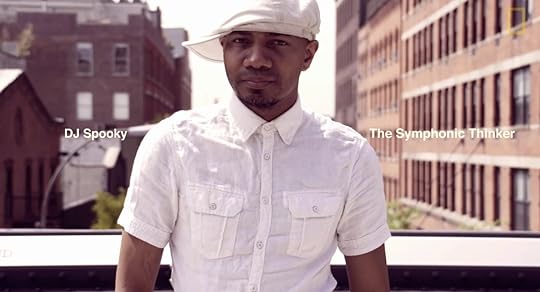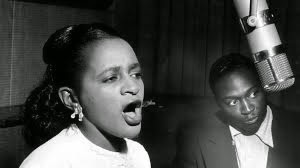Mark Anthony Neal's Blog, page 778
November 16, 2014
Spike Lee: Post-Racial America is "Bullshit"
 Fusion
Fusion
Director Spike Lee on race in America: “If you’re African-American in this country, you know what the deal is.” Fusion’s Jorge Ramos spoke to Lee about his latest documentary “I Can’t Breathe,” problems with the NYPD, race in America and the impact of social media on his projects.What do you think?
Published on November 16, 2014 20:04
Anthony Hamilton Talks New Album 'Home for the Holidays'
Published on November 16, 2014 17:39
Kendrick. SNL. i.
Published on November 16, 2014 17:17
Nyle Fort—The Young Minister at the Heart of #Ferguson
 Fusion
Fusion
Nyle Fort recently focused his activism in Ferguson, where officer Darren Wilson killed Mike Brown, an unarmed black teenager, on Aug. 9. Fort was one of thousands of community leaders to descend on the small St. Louis suburb and lend his voice to the protest known as #FergusonOctober. It was an opportunity to deliver a very simple message to the world: #BlackLivesMatter.
Published on November 16, 2014 16:49
November 15, 2014
"I'd Like to Think of Music as Information"-- DJ Spooky Mixes Media to Spark Thought
 National Geographic
National Geographic
With cultural and environmental issues as its backbeat, the music of National Geographic 2014 Emerging Explorer Paul D. Miller aka DJ Spooky creates a space to ponder and address some of society's biggest questions.
Published on November 15, 2014 10:45
The Most Famous 19th Century African American Writer You've Never Heard Of: William Wells Brown

Courtesy of W.W. Norton PRI
William Wells Brown was one of the most prominent African American writers in the 19th century. But many people now don't know who he is.
Published on November 15, 2014 07:19
"It's Time To 'Obliterate The Term Black Film'"--Director Gina Prince-Bythewood
Published on November 15, 2014 06:51
What to do with The Body? The Clara Ward Singers Perform "Joshua Fit the Battle of Jericho"

There are lots of reasons why Clara Ward raised eyebrows in Black religious circles: The sequined dresses, the unbridled commercial enterprise associated with her music, the not-so-secret long-term companionship with Rev. CL Franklin--yet as this clip of the Clara Ward Singers from the late 1960s shows, it may have also been the embodiment of the erotic aspects of Black spirituality. Lead vocalist on this track, Malvilyn Statham, ain't 'shamed of her body and how it moves.
Published on November 15, 2014 04:46
November 14, 2014
When Jazz is Religion by Mark Anthony Neal
 James Todd | Duke ChapelWhen Jazz is Religionby Mark Anthony Neal | @NewBlackMan | NewBlackMan (in Exile)
James Todd | Duke ChapelWhen Jazz is Religionby Mark Anthony Neal | @NewBlackMan | NewBlackMan (in Exile)
From the adage “trying to make a way out of no way” to Al Green singing Thomas A. Dorsey’s “The Lord Will Make a Way Some How,” Black religious vision in the United States found it's groundings in God’s caprice and the belief in individual agency, or what I’ll call social improvisation. That so much of Black expressive culture is also informed by the artistic practice of improvisation, most explicitly in Jazz, speaks to the agility and adaptivity for which Blackness is premised in the US.
Jazz Vespers, a religious service-turned-performance piece held recently at Duke University Chapel, made explicit links between traditional Christian religious practices and musical improvisation, by wedding Vespers--an ancient Christian service of music, prayers and scripture--with Jazz improvisation.
Luke A. Powery, the Dean of the Chapel at Duke University was joined by the John Brown (little) Big Band and vocalist Lois Deloatch in a performance that interspersed traditional Christian hymns like “Great Is Thy Faithfulness,” Gospel originals like “Thank You, Lord” and classics such as “When the Saints Go Marching In.” The latter song opened the performance with the brass section marching to the front of the sanctuary, capturing the down-home spirit that Louis Armstrong brought to the song on his 1938 recording.
 James Todd | Duke Chapel
James Todd | Duke Chapel
Throughout his career, Rev. Dr. Powery has been known for his integrating of the Black sermonic tradition and Black Spirituals--often breaking out in song during his own sermons--recalling a tradition, perhaps best exemplified by the late Rev. C.L. Franklin. As Powery writes in his book Dem Dry Bones: Preaching, Death and Hope, “African American sermons have historically been known to be musical because music and speech are inseparable as African traditions treat songs like speech and speech like songs.” (23)
While there are any number of ordained ministers who have successful singing careers contemporarily--think Donnie McClurkin--the linking of Black religious traditions to Jazz, is often forgotten. The connection between the two traditions was, perhaps, most pronounced when Mahalia Jackson and Duke Ellington recorded Black, Brown, and Beige (1958).
It goes without saying the Jazz Vespers was intended to suggest the renewed possibilities of the marriage of Jazz and Black religious practice. As such the centerpiece of the evening was a recitation of “Premature Autopsies”--a secular sermon written by Stanley Crouch and commissioned by Wynton Marsalis for his 1989 recording Majesty of the Blues, which featured the oratory of Rev. Dr. Jeremiah Wright.
“Premature Autopsies”--written to reject the notion that “Jazz is Dead,” while establishing Duke Ellington as America’s most important composer--is a powerful reminder of the role of culture and music in Black resistance and survival. As Crouch writes, “It swung low and it swung upward and it wore wings. It knew that its shining armor would fit it well because it tried that armor on at the gate of slavery’s hell. It was the ethereal aerodynamics of musical art in America.”
By the time Rev. Dr. Powery led the brass section out of the sanctuary with a rousing rendition of “Glory, Glory, Hallelujah” it was clear that not only was Jazz alive and well but it still remains integral to Black religious practice.
Published on November 14, 2014 17:47
"Posing in Prison" a Lecture by Professor Nicole R. Fleetwood--November 21, 2014 @ Duke
 Women's Studies at Duke
Women's Studies at Duke
Posing in Prison A Lecture by Professor Nicole Fleetwood
Duke UniversityFriday November 21, 2014Blue Parlor | East Duke Building
"Posing in Prison" examines vernacular photography and studio portraiture that take place inside U.S. prisons through an investigation of the production practices and the circulation of these images in and out of prisons. The photographs include images that document family visits to incarcerated relatives and portraits taken by incarcerated photographers in makeshift studios designed by prisoners. Fleetwood considers how such photographs function as practices of intimacy and attachment for incarcerated subjects and their loved ones.
Nicole R. Fleetwood is an associate professor of American Studies and director of the Institute for Research on Women at Rutgers University, New Brunswick. She is the author of Troubling Vision: Performance, Visuality and Blackness (U Chicago P, 2011). Her current book is a study of prison art and visuality in the era of mass incarceration.
Published on November 14, 2014 09:13
Mark Anthony Neal's Blog
- Mark Anthony Neal's profile
- 30 followers
Mark Anthony Neal isn't a Goodreads Author
(yet),
but they
do have a blog,
so here are some recent posts imported from
their feed.






